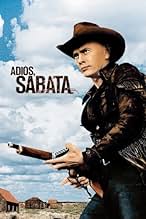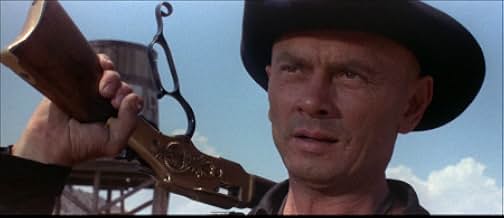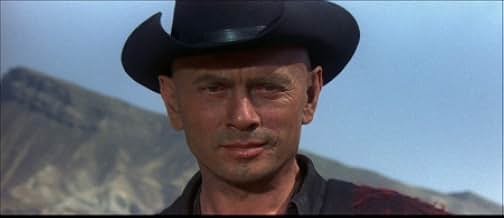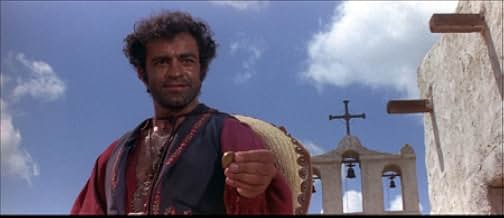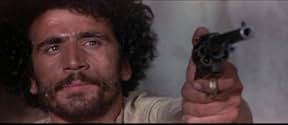NOTE IMDb
5,9/10
2,4 k
MA NOTE
Ajouter une intrigue dans votre langueSabata helps a band of Mexican revolutionaries steal a wagon-load of gold from the occupying Austrian forces of Emperor Maximilian I.Sabata helps a band of Mexican revolutionaries steal a wagon-load of gold from the occupying Austrian forces of Emperor Maximilian I.Sabata helps a band of Mexican revolutionaries steal a wagon-load of gold from the occupying Austrian forces of Emperor Maximilian I.
Ignazio Spalla
- Escudo
- (as Pedro Sanchez)
Gérard Herter
- Colonel Skimmel
- (as Gerard Herter)
Turam Quibo
- Gitano
- (as Joseph Persaud)
Nieves Navarro
- Kingsville Saloon Dancer
- (as Susan Scott)
Vittorio Caronia
- 1st Lt. Steiner
- (as Vitti Caronia)
Histoire
Le saviez-vous
- AnecdotesThis was not originally a Sabata film. The original Italian title translates as "Indio Black, you know what? You're a big son of a...", Indio Black being the character played by Yul Brynner, but the title and Brynner's character name were changed for the American release to cash in on Sabata (1969), the original Sabata film. Lee Van Cleef was asked to star in this film, but rejected the offer for some reason. He was then replaced by Brynner, whose character would only be called Sabata in the international English language version, and Indio Black in the Italian version. However, lip reading viewers have noticed that the actors who mouth their lines in English, seem to say "Sabata", not "Indio", so the re-baptism took place while the film was still being shot.
- GaffesWhen Sabata invades Colonel Skimmel's quarters, he sees the reflection of a person hiding behind the door. The person in the reflection is not Hertz.
- ConnexionsEdited into Spaghetti Western Trailer Show (2007)
Commentaire à la une
Firstly, this is *not* a sequel to 1970's "Sabata" ("Ehi amico... c'è Sabata, hai chiuso!") although it can be considered a follow up of sorts. Lee Van Cleef did not reprise the role until 1971's "Return of Sabata". "Adiós Sabata" was originally about a character called Indio Black and completely unrelated to the previous Sabata story - Indio, I believe, was meant to be nothing more than a bandit. The name was changed to cash in on the success of "Sabata" - though this film could be considered a true Sabata entry as a couple of stars return (Pedro Sanchez, Gianni Rizzo) and the screenwriters and director are the same. Gianfranco Parolini (Frank Kramer) perhaps out does the previous film here, keeping everything tighter - "Sabata" was a little too jokey (although still excellent and one of the truly great Italian westerns) whereas this is blatantly tongue in cheek. I feel the music is better in this film, never intrusive and always fitting: a triumph for Bruno Nicolai, despite the fact that it is incredibly reminiscent of Morricone.
As Sabata, Brynner is a kind of anti-hero counterpart to Chris from "The Magnificent Seven"; he even dresses out all in black here too. Gérard Herter is great as the Austrian Colonel Skimmel at the time of Emperor Maximillian's Mexico - a kind of borderline camp, Bond villain type, complete with monacle and perfectly trimmed moustache. Oh, and yes, he is a dead shot with a rifle. In "Sabata", Franco Ressel's Stengel had his shootout's behind man shaped shields (to live at the peak of danger or some such nonsense) as his playtoy; Herter's Skimmel has an even better one - a drawer beneath a model ship that when opened fires each cannon on the model directly into whoever opens the drawer. Like "The Good, the Bad and the Ugly" (which this film contains some surprisingly subtle references to) the plot centres around a shipment of gold: Sabata, Escudo (Sanchez) and Ballantine (Dean Reed) want the wagon load of gold, but it is also coveted by Maximillian's rebels. The scenes with the gold and the gold dust being poured out/spilled is nicely complimented by Nicolai's incidental music which really does bring out the joy of the characters.
I personally think it's a shame that Brynner and the others weren't brought back for another Sabata film because he plays the role much straighter than Van Cleef did and really does come across as a tough guy here, who doesn't need to rely on his gun. "Adiós Sabata" is a classic in it's own right and doesn't need to be viewed with the other Sabata entries. It's only downside is that after surpassing the superb original, it left most people disappointed with the later "Return of Sabata".
Are these subtle hints to Leone's 1966 masterpiece? Sanchez: "Me, I'd make a hiding place no-one would find - stick it in the ground, maybe in a cemetery..." Reed (the last line): "Hey fellas - are you gonna help me pick up the gold or not, you sons of...!" (music takes over)
As Sabata, Brynner is a kind of anti-hero counterpart to Chris from "The Magnificent Seven"; he even dresses out all in black here too. Gérard Herter is great as the Austrian Colonel Skimmel at the time of Emperor Maximillian's Mexico - a kind of borderline camp, Bond villain type, complete with monacle and perfectly trimmed moustache. Oh, and yes, he is a dead shot with a rifle. In "Sabata", Franco Ressel's Stengel had his shootout's behind man shaped shields (to live at the peak of danger or some such nonsense) as his playtoy; Herter's Skimmel has an even better one - a drawer beneath a model ship that when opened fires each cannon on the model directly into whoever opens the drawer. Like "The Good, the Bad and the Ugly" (which this film contains some surprisingly subtle references to) the plot centres around a shipment of gold: Sabata, Escudo (Sanchez) and Ballantine (Dean Reed) want the wagon load of gold, but it is also coveted by Maximillian's rebels. The scenes with the gold and the gold dust being poured out/spilled is nicely complimented by Nicolai's incidental music which really does bring out the joy of the characters.
I personally think it's a shame that Brynner and the others weren't brought back for another Sabata film because he plays the role much straighter than Van Cleef did and really does come across as a tough guy here, who doesn't need to rely on his gun. "Adiós Sabata" is a classic in it's own right and doesn't need to be viewed with the other Sabata entries. It's only downside is that after surpassing the superb original, it left most people disappointed with the later "Return of Sabata".
Are these subtle hints to Leone's 1966 masterpiece? Sanchez: "Me, I'd make a hiding place no-one would find - stick it in the ground, maybe in a cemetery..." Reed (the last line): "Hey fellas - are you gonna help me pick up the gold or not, you sons of...!" (music takes over)
- johnwaynefreak
- 3 févr. 2003
- Permalien
Meilleurs choix
Connectez-vous pour évaluer et suivre la liste de favoris afin de recevoir des recommandations personnalisées
- How long is Adiós, Sabata?Alimenté par Alexa
Détails
Box-office
- Montant brut aux États-Unis et au Canada
- 546 926 $US
- Durée1 heure 44 minutes
- Rapport de forme
- 2.35 : 1
Contribuer à cette page
Suggérer une modification ou ajouter du contenu manquant

Lacune principale
By what name was Adios Sabata (1970) officially released in India in English?
Répondre

